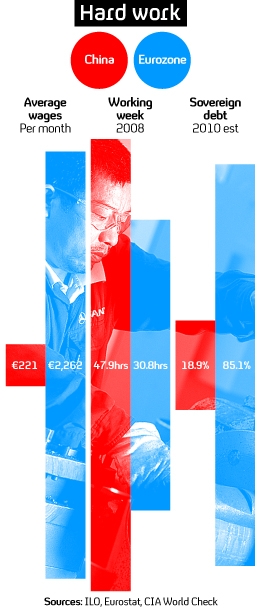‘Sloth inducing’ labour laws to blame for eurozone crisis
The welfare system is the “root cause” of the eurozone crisis, says Jin Liqun from China’s sovereign wealth fund, and working harder and longer would solve its problems.
Faisal Islam interviews Jin Liqun. Scroll to the bottom of the page for the full interview.
Jin Liqun, chairman of China’s sovereign wealth fund, China Investment Corporation (CIC), delivered a message of tough love to the eurozone, at a time when G20 finance leaders are holding crisis talks in Paris.
Speaking exclusively in Paris to Channel 4 News’ economics editor, Faisal Islam, the man who oversees China’s giant government investment funds said that the eurozone debt is merely symptomatic of a bigger problem within the eurozone financial system.
Attempts to reduce the debt will only go so far if old-fashioned labour laws remain, he said.
“The root cause of trouble is the overburdened welfare system, built up since the second World War in Europe – the sloth inducing, indolence inducing labour laws,” he said, and added that China will only invest in Europe’s crisis-ridden banking system if it can be sure “there are no black holes”.
To really reform the eurozone, there needs to be greater productivity in the labour force, said Mr Jin.
The root cause of trouble is the overburdened welfare system, built up since the second World War in Europe – the sloth inducing, indolence inducing labour laws. Jin Liqun
“People need to work a bit harder, they need to work a bit longer, and they should be more innovative. We [the Chinese] work like crazy,” he added.
“The European countries enjoy a lot of advantages in science, technology, in managerial expertise. You just need to tap those advantages and you will be back on your feet.”
Read more: Faisal Islam on the economic crisis in France

China vs Eurozone
In comparison with how many hours are put in by the Chinese labour force, Europeans are certainly taking it easy. Based on 13 eurozone countries, the average working week is 30 hours, compared with 47.9 hours a week in China.
Europeans also fare much better in terms of income. Based on data from the International Labour Organisation (ILO), Channel 4 News has calculated that the average monthly income in the eurozone is 2,262 Euros.
This compares with an average of 221 euros a month in China: in the private sector, the average is 159 euros per month, while public sector workers have a higher monthly income of 282 euros.
The absence of a welfare system in China has contributed to the culture of long working hours, says Patrick Belser, economist at the ILO, as people feel they have to work to try and save money.
However it is unlikely that Mr Jin’s sentiments about the deadening economic effect of the welfare system will be shared by the majority of Chinese people.
“Chinese people aspire to better conditions of work. They want to see the benefits of the country’s strong growth,” Mr Belser told Channel 4 News.
Labour migration
China’s huge expansion of industry and infrastructure in the last decades has seen a boom in demand for a labour. And unlike Europe, Chinese people seem more than willing to move for work – from rural areas to the city.
This has resulted in employers being able to take their pick of employees, and workers having fewer rights. “Because there’s huge labour migration, factories have a lot of choice, so if you say you don’t want to work overtime, you might lose your job,” says Mr Belser.
In recent years, there has been growing unrest among workers in China, who called for better pay and conditions, and this has resulted in a rise in China’s minimum wage. But although legislation to give workers more rights does exist, “the government still has work to do to get companies to comply with this,” Mr Belser told Channel 4 News.
And while Chinese people continue to have no welfare system to fall back on during periods of illness or after retirement, China’s culture of long hours for little pay is likely to continue.
Watch the full interview with Jin Liyun below.




